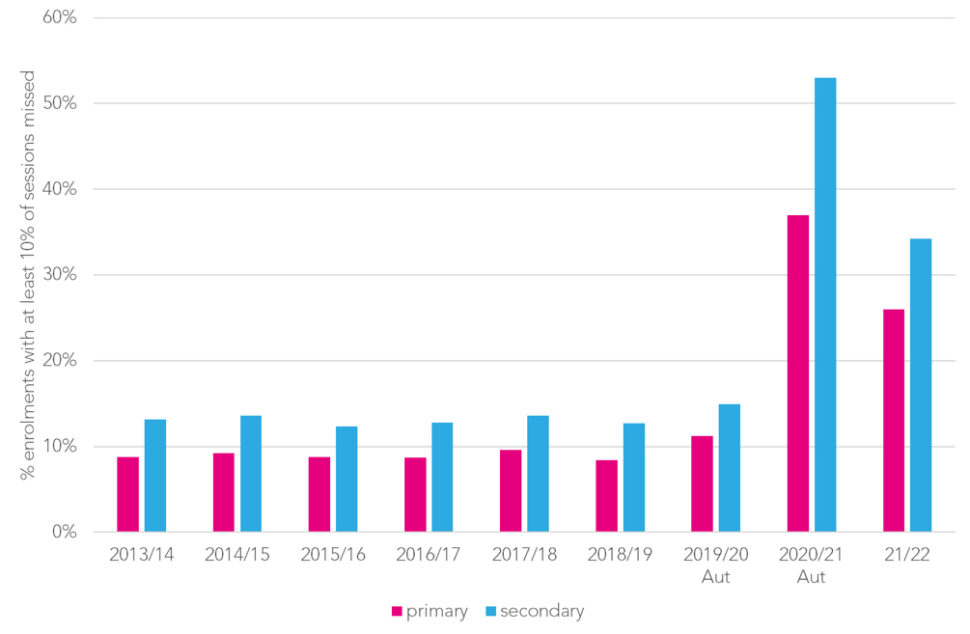Pupils who are persistently absent will be assigned mentors under a new £5 million trial to boost school attendance in disadvantaged areas.
It comes after new data showed more than a third of secondary pupils have been persistently absent from school this year.
A tender notice published by the Department for Education reveals ministers are seeking an organisation to recruit and train mentors “to provide targeted one-to-one support” to youngsters and their families to “overcome attendance barriers”.
The government announced in its levelling-up white paper that it would target support for issues such as attendance at 55 “education investment areas” across England.
The successful bidder will initially work for one year in one of the areas, supporting between 500 and 1,000 pupils.
But the contract will include the option to “scale up to multiple areas nationally and support larger volumes of pupils in years two and three”.
Mentors to have ‘conversations’ with absent pupils
Mentors will have “conversations” with pupils and families. They may also work with “external local agencies” to improve school attendance.
Many schools and academy trusts already employ attendance leads, or staff who mentor pupils to cut absence rates.
Greenwood Academies Trust recently advertised for an “attendance officer – learning mentor”, while the Redhill Academy Trust sought an academic mentor whose duties include chasing up pupils with low attendance.
But a recent analysis by the Education Endowment Foundation found “not enough evidence” to back mentoring approaches to boost attendance.
The government said the scheme aims to “enhance capacity” for early help and intervention by working with persistently absent pupils or those at risk of “severe” absence – which means missing half of sessions.
Data from Education Datalab showed persistent absence – the proportion of pupils missing 10 per cent or more sessions – remained high at 26 per cent of primary pupils and 34 per cent of secondary pupils so far this year.
Persistent absence, 2013 to 2022

These are down from highs of more than 50 per cent and just under 40 per cent respectively in the autumn term of 2020. But they are still far higher than normal years, when primary persistent absence is usually between 8 and 10 per cent, and secondary is about 13 per cent.
Severe absence – pupils missing over half of sessions – also remains at over 3 per cent in secondary schools this academic year.
The latest government statistics showed 12.1 per cent of pupils were persistently absent and 1.1 per cent were severely absent in 2020-21. The figures are lower because Datalab counts Covid isolation, while the DfE does not.
Datalab found that increases in persistent absence were driven by rises in authorised absence, with unauthorised absence rates remaining similar as in previous years.
Government data shows pupils missed 328 million in-person school days in 2020-21, 270 million because of Covid. This represents a five-fold increase in days missed compared with 2018-19, the last normal year before the pandemic.
Ministers have said they are worried the pandemic has exacerbated persistent absence. About 12,000 schools now use a new daily attendance tracker pilot.
Covid disruption far from over
The latest government attendance data also shows disruption because of Covid is far from over.
Covid-related pupil absence trebled in just two weeks, while almost one in ten teachers was off last week.
Nationally, pupil attendance fell from 92.2 per cent to 89.7 per cent, reversing a recent trend of rising attendance rates.
Geoff Barton, the general secretary of the ASCL school leaders’ union, said the government “must as an absolute minimum continue to make available free Covid testing for education settings after April 1”.
The Guardian reported that free tests for schools would end this month. The government has refused to confirm the plans.
Meanwhile, Datalab also warned this week that disadvantaged year 11 pupils have missed much more school than their better-off counterparts.
Barton said it was an “extremely challenging situation” as pupils prepared for exams.
















Your thoughts